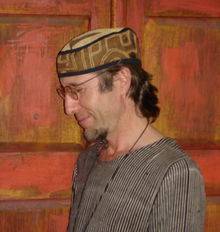- David Abram
-
David Abram (born June 24, 1957) is an American philosopher, cultural ecologist, and performance artist, best known for his work bridging the philosophical tradition of phenomenology with environmental and ecological issues. He is the author of Becoming Animal: An Earthly Cosmology, published in 2010[1] and of The Spell of the Sensuous: Perception and Language in a More-than-Human World,[2] for which he received, among other awards, the international Lannan Literary Award for Nonfiction. Abram is founder and creative director of the Alliance for Wild Ethics (AWE); his essays on the cultural causes and consequences of ecological disarray have appeared often in such journals as Orion, Environmental Ethics, Parabola, Tikkun, and The Ecologist, as well as in numerous anthologies.
Contents
Biography
Born on Long Island, Abram grew up among the marshes and creeks that wind through coastal suburbia. David's mother is a performing concert pianist. He began practicing sleight-of-hand magic during his high school years in Baldwin, which sparked his ongoing fascination with perception. In 1976, he began working as "house magician" at Alice's Restaurant in the Berkshires of Massachusetts, and soon was performing at clubs throughout New England while studying at Wesleyan University. He took a year off from college to journey as a street magician through Europe and the Middle East; toward the end of that journey, in London, he began exploring the application of sleight-of-hand magic to psychotherapy under the guidance of Dr. R. D. Laing. After graduating summa cum laude from Wesleyan in 1980, Abram traveled throughout Southeast Asia, living and studying with traditional, indigenous magic practitioners in Sri Lanka, Indonesia, and Nepal. When he returned to North America he became a student of natural history and ecology while continuing to perform in Canada and the United States. A much-reprinted essay written while studying at the Yale School of Forestry in 1984 — entitled "The Perceptual Implications of Gaia" — brought Abram into association with the scientists formulating the Gaia Hypothesis, and he was soon lecturing in tandem with biologist Lynn Margulis and geochemist James Lovelock in Britain and the United States. In the late 1980s, Abram turned his attention to exploring and articulating the decisive influence of language upon the human senses and upon our sensory experience of the land around us. Abram received a doctorate for this work from the State University of New York at Stony Brook, in 1993.
Work
David Abram's writing is informed by his work with indigenous peoples, as well as by the American nature-writing tradition that stems from Henry David Thoreau and Walt Whitman. His philosophical work is informed by the European tradition of phenomenology — in particular, by the work of the French phenomenologist, Maurice Merleau-Ponty. Abram's work has also been influenced by his friendships with the archetypal psychologist James Hillman and with the radical social critic, Ivan Illich — as well as by his esteem for the American poet Gary Snyder and the agrarian poet and essayist Wendell Berry. In 1988, while pursuing his doctorate, David was invited by the maverick ecologist Paul Shepard to temporarily fill Shepard's teaching position (while Shepard pursued a year's research overseas), as Visiting Professor of Ecology and Natural Philosophy at the Claremont Colleges in California. Since that time, Abram has offered seminars at universities around the world, while nonetheless maintaining his independence from the institutional world of academia. His ideas have often been debated (sometimes heatedly) within the pages of Environmental Ethics and the Journal of Environmental Philosophy. an academic journal dedicated to matters of environmental philosophy.[3] In 2001, the New England Aquarium and the Orion Society sponsored a large public debate between David Abram and distinguished biologist E. O. Wilson, at Faneuil Hall in Boston, on science and ethics. (An essay by Abram that grew out of that debate, entitled "Earth in Eclipse," has been published in several versions). In the summer of 2005, Abram delivered a keynote address for the United Nations “World Environment Week” in San Francisco, to 70 mayors from the largest cities around the world. Abram founded the Alliance for Wild Ethics with several colleagues in 2006. He is profiled in the 2007 book, Visionaries: The 20th Century’s 100 Most Inspirational Leaders[4] and was named by the Utne Reader as one of a hundred visionaries currently transforming the world,[5] He has been the recipient of numerous honors, including fellowships from the Rockefeller and Watson Foundations. The father of two small children, David Abram lives in the foothills of the southern Rockies.
See also
- American philosophy
- List of American philosophers
References
- ^ "Becoming Animal by David Abram". Random House. http://www.randomhouse.com/catalog/display.pperl/9780375421716.html. Retrieved 2010-11-13.
- ^ David Abram, The Spell of the Sensuous: Perception and Language in a More-than-Human World, New York: Vintage, 2007.
- ^ See, for example, Ted Toadvine, "Limits of the Flesh: The Role of Reflection in David Abram's Ecophenomenology" and David Abram, "Between the Body and the Breathing Earth: A Reply to Ted Toadvine" in Environmental Ethics, summer 2005 issue. See also Eleanor D. Helms, "Language and Responsibility" in the Spring 2008 issue of Environmental Philosophy. See also Meg Holden, "Phenomenology versus Pragmatism: Seeking a Restoration Environmental Ethic." Spring 2001 issue (and Abram's reply in the Fall 2001 issue).
- ^ Chelsea Green Press, 2007.
- ^ See "100 Visionaries," Utne Reader, Jan/Feb 1995; and "The Loose Canon: 150 Great Works to Set Your Imagination On Fire," Utne Reader, May/June 1998.
External links
Categories:- 1957 births
- Wesleyan University alumni
- American ecologists
- American philosophers
- Living people
Wikimedia Foundation. 2010.

